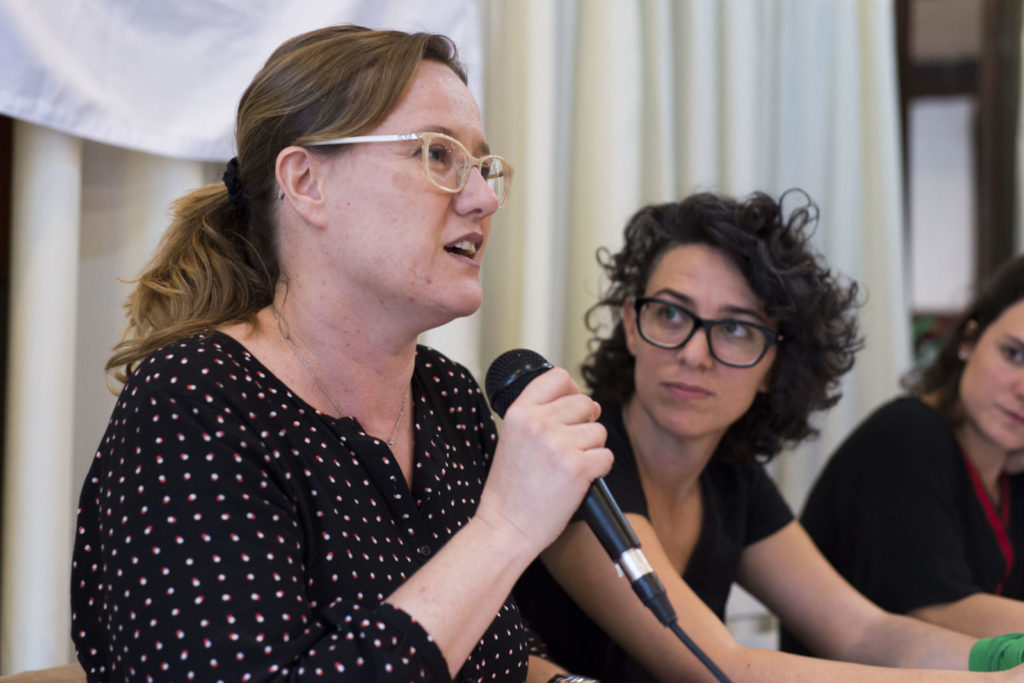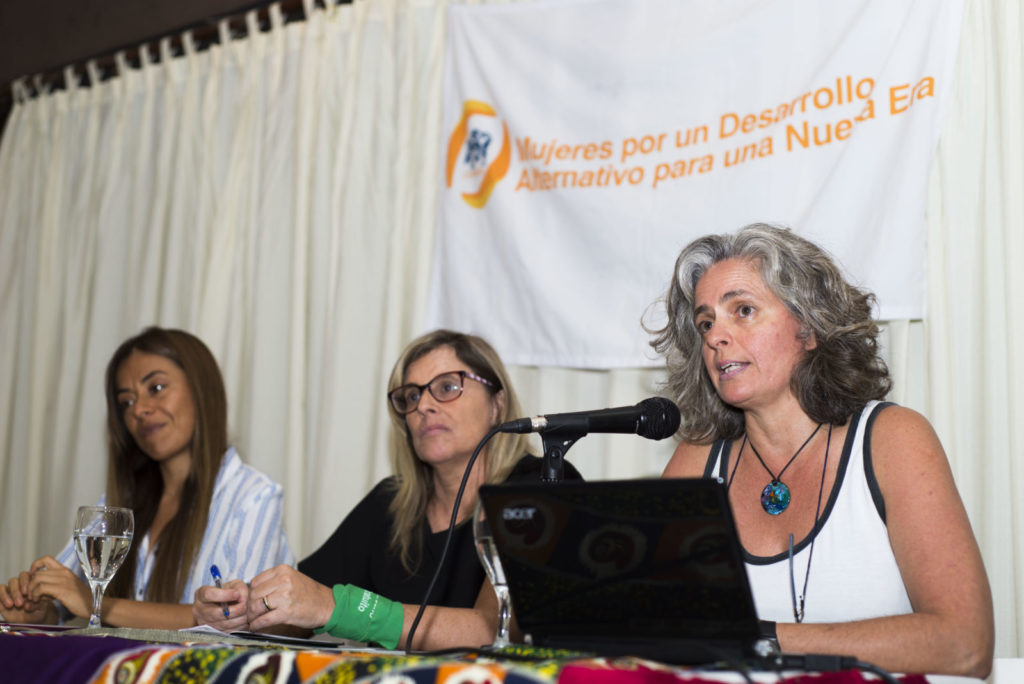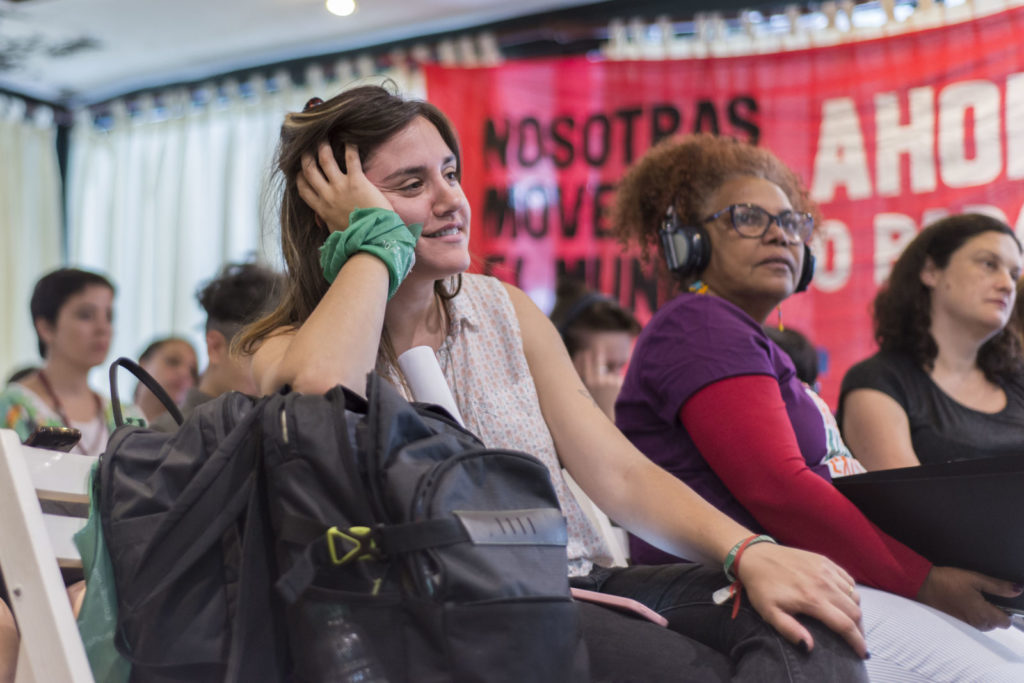In the context of the Global Week of action against G20 and the International Monetary Fund, last Tuesday 27th November DAWN promoted the initiative of the “School of Feminist Economics: Narratives and Resistance against Financial Capitalism and Corporate Power” in Buenos Aires City, Argentina.

This initiative was co-organised by Argentinean Association for the Research in Women’s History and Gender Studies (AAIHMEG), Asamblea Argentina Mejor sin TLC, Espacio de Economía FeminisSEC, Friedrich-Ebert-Stiftung-Argentina, Quimeras (Argentina), SOS Corpo Feminist Institut for the Democracy (Brazil), Intersections Journal (Argentina), CREES (Argentina), AAI, AWID, Asamblea NoG20 and Cátedra Libre Virginia Bolten (Argentina). We met at the Bauen Cooperative Hotel to discuss the logistics and highlight cooperative and collective projects between our regional and international networks.
Since 1984, DAWN has been developing research programmes, advocacy and training projects for feminists from the Global South. For more than three decades DAWN has been mobilising processes rooted in social solidarity and gender, economic, political, ecological and social justice. DAWN has been an active member of the Feminist Forum against G20 along with other feminist political and social organizations. This Forum is a continuation of the Feminist Forum against Free Trade, which feminists and women´s organisations promoted as a space to challenge the 11th Ministerial Conference of the World Trade Organization which took place in December 2017, in Buenos Aires, Argentina.
As an assessment of the international, collective and diverse process of the Feminist Forum against Free Trade, we identified the need of developing training projects, social mobilization and dissemination of feminist analytical and methodological tools to resist neoliberalism at a global level. We proposed the initiative of having the School of Feminist Economics to analyse financial capitalism, corporate capture, digital economy, funding of public policies, future of work and to share feminists experiences of resistance against gender inequalities, capitalism, racism and fascism.

The School gathered more than 14 experts from different countries, such as Paraguay, Ecuador, Brazil, France, Kenya, Spain, Uruguay and Argentina, who are also feminist and LGTBQ activists participating in networks and organisations all over the world. During the journey, it emerged quite clearly that we live under the rules of an economic system characterised by its extractivist character. This system in turn, takes advantage of women´s labour, which is already precarious, underpaid and often not remunerated but central to supporting the system. The experts also reflected on how the new narratives around the private financing of the access to goods and services hides the reduction in public budgets, as a result of financial illicit flows.
The School took place days before the Leaders´Summit of G20, allowing for space to reflect on the connections between the reflections around feminist economics and the G20 agenda. In this regard, the groups reflected on that instead of promoting rural development, digital, financial and labor inclusion, the G20 leaders instrumentalize our historical struggles and concepts. They talk about “gender perspective ” or “economic empowerment ” for women but we know that the policies they promote bring us more free trade agreements, indebtment, corporate capture which increase the gender inequality and asymmetries inside the countries and between North-South. We say “Not in our name”, not without our voices, without people’s and women participation, not without LGTBQ movement and all the affected communities and peoples.

With more than 180 participants from over the world, the last panel of the School of Feminist Economics shared democratic, economic feminists experiences of resistance in the belief that we have to continue working together and internationalizing this process against economic inequality and despoliation. This experience teaches us that economic issues are not foreign to us. Economics includes recognition, redistribution and remuneration of women’s unpaid work in homes, communities and organizations. We have a great deal to contribute to political and economic studies. Our diverse and global experiences of taking care of our bodies and our lands help us to build our strategies in order to make visible that empowerment is so far away from what G20/W20’s agendas want to impose on us.
